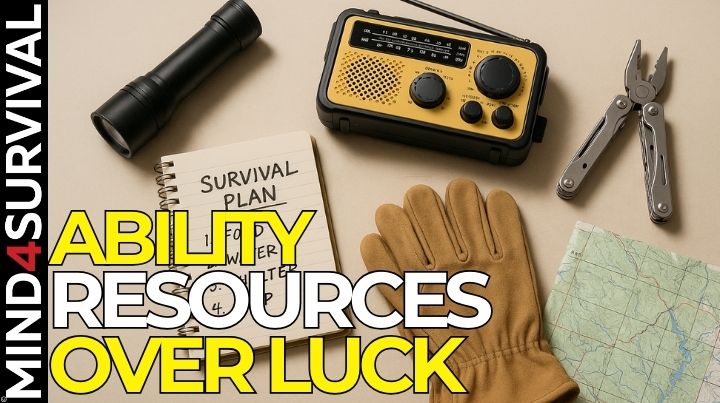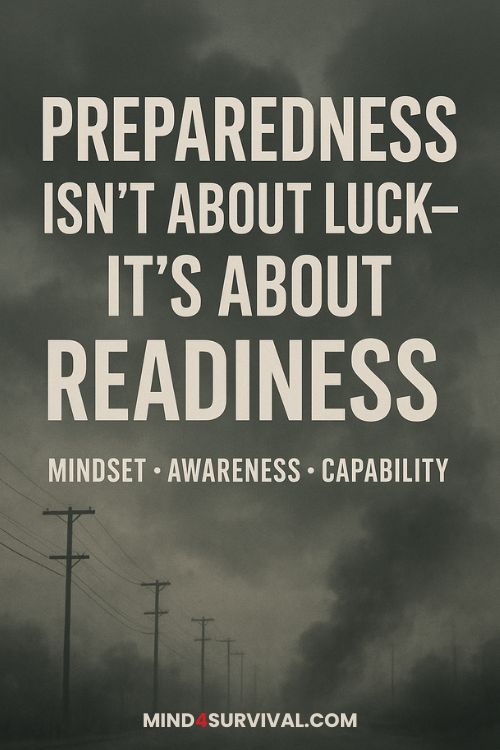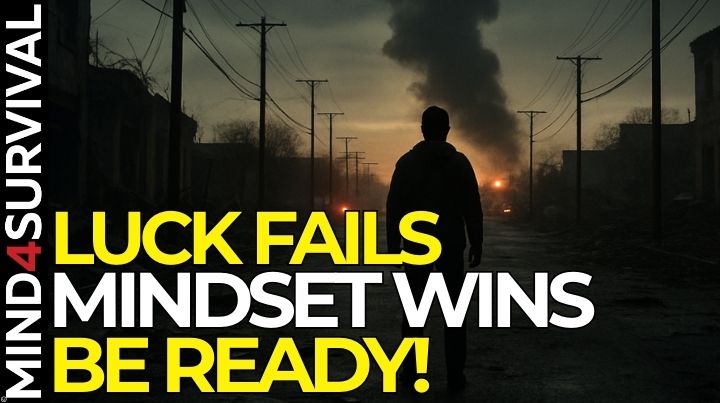Podcast: Play in new window | Download
What if I told you that when the next major disaster strikes—you’ll most likely be behind, not ahead? That’s part of what SHTF mindset is all about.
No matter how prepped you feel, when you’re at the epicenter of a serious crisis, you’ll likely start off scrambling to get ahead. You’ll start as the underdog.
You don’t control the clock. You don’t get to pick the terrain. And the systems you thought you could count on? Nothing is guaranteed when the worst happens.
Minor emergencies? Sure, you might be able to muscle through. Those with instinct or grit are often good to go. But major, societal, and system-shaking events? They hit with more force than you expect and expose the unseen cracks in the foundation.
And you? You’re scrambling. Reacting. Playing catch-up.
That’s the uncomfortable truth. And it’s exactly why preparedness can’t be passive. It’s why mindset matters and situational awareness matters. And it’s why, if you want to come out the other side, you need to train like the fight has already started—and you’re behind on points.
Once you realize you’re always the underdog when it hits the fan, you can start preparing like someone who plans to fight, to lead, and maybe—just maybe, come out on the other side no worse for wear.
TL;DR When disaster strikes—you’re the underdog trying to keep up. But with the right mindset, situational awareness, and practical readiness, you can stack the odds in your favor and come out ahead.
Quick Look at What You’ll Learn
When the SHTF, the Playing Field Is Never Even
Let’s break it down. When it hits the fan:
- You don’t always get a warning. Even when you do, it’s usually not enough. Disasters rarely show up with a countdown timer and a user manual.
- You’re going to start at a disadvantage. The lights go out. The water stops flowing. Emergency services get overwhelmed. Many people panic.
- The threats and hazards are unpredictable. It might be a wildfire, a tornado, civil unrest, or a grid failure. The disasters change. Your situation changes. But what are the odds when it hits the fan? They’re almost always against you.
This isn’t Hollywood. In the real world, when the mess is big enough, the cavalry may not be there when you need them. In that case, you’re the cavalry—tired, under-resourced, and possibly playing catch-up in your own rescue.
That’s the nature of a real crisis, especially when the SHTF and the situation overwhelms basic systems and instincts alike. Think Hurricanes Helene and Katrina. Look to the L.A. and Maui Wildfires. Many survived through self-rescue—they were their own first responders.
That’s why we prepare.
Because when people accept that disasters don’t fight fairly, they start stacking the odds back in their favor.
Mindset Is the First Advantage
If you’ve read Mind4Survival, you already know the formula:
Capability × Luck = Chance of Success
And what’s Capability?
Mindset × Ability.
In every emergency, mindset is what determines whether you freeze, fall apart, or fight like hell to adapt and overcome.
That’s why the most important prep isn’t the gear in your closet—it’s the perspective in your head.
- A solid mindset keeps you from wasting time in denial.
- It lets you act fast and with purpose while others are often stuck in confusion and meltdown.
- It grounds you when the world spins out.
Most people? They assume someone else is going to fix it. They have normalcy bias and don’t like to think about the major, What-ifs?” Instead, their perspective is that they’ll be fine—until “it” happens.
But you’re not most people.
You already know that preparedness is uniquely personal. Responsibility is individual.
If you can own that mindset, even while you’re standing in chaos and/or rubble, you’ve already won half the battle.
Situational Awareness: Understand Before You React
Situational awareness is how you avoid being blindsided. It’s how you see the problem or opportunity coming—and get a head start.
If mindset is your internal compass, situational awareness is your radar. It lets you detect trouble early, interpret what’s really going on, and make decisions that keep you from becoming another victim.
This is where the OODA Loop comes in—Observe, Orient, Decide, Act. It’s not just a military framework. It applies across all aspects of life, including self-reliance:
- Observe: Take in what’s happening. Weather. Behavior. Traffic. Systems failing. Systems holding.
- Orient: Filter that info through your experience and biases. Understand what’s actually going on—not just what you hope is happening. Understand that you’re very likely to feel overwhelmed at first—it’s normal.
- Decide: Choose your move. Not tomorrow. Now.
- Act: Move with purpose. Adjust on the fly. Repeat the loop as needed.
The people who make it out are rarely the strongest or the best equipped. They’re the ones who saw it coming, read it right, and acted fast.
If you wait to understand until it’s already happening, you’re not responding. You’re anticipating and making things happen.
Situational awareness isn’t about paranoia—it’s about perspective. It’s about being ready to act, not just relying on hope.
Ability Gives You Options
Mindset without skill is just noise—confidence with no follow-through.
If mindset is how you see and think about the problem, ability is how you physically deal with it.

Ability isn’t about being a super-human operator. It’s about practical readiness for your situation, built from your real-world of strengths and weaknesses:
- Knowledge: The information you’ve studied, practiced, or retained. This could mean understanding first aid, fire safety, communications, home security, or how to handle shortages. Not just facts, but knowing when and how to use them.
- Experience: Having worked through challenges before—whether in training, drills, or life. Experience builds judgment. It gives you muscle memory and mental familiarity when everything is moving fast.
- Resources: The tools, supplies, and relationships you’ve put in place before the crisis hits. From backup power to local contacts—these are the things that give you reach and options when others are out of gas, out of time, and out of ideas.
The people who succeed when it hits the fan aren’t the ones who had everything—they’re the ones who had enough of the right things, and knew what to do with them.
You don’t need perfection. You need readiness.
That’s the only kind of edge an underdog ever gets: earned advantage.
Luck Still Plays a Role—But Don’t Count On It
Sometimes things still go sideways.
You can have the right plan, take the right steps, and still face something unexpected—a breakdown, a sudden medical emergency, a fast-moving event. That’s not failure. That’s life. And it’s exactly why we prepare.
Luck—good or bad—is the part of the equation you can’t control. But the more you sharpen your mindset and ability, the more you reduce your exposure to bad outcomes—and increase your chances of adapting well when opportunity or crisis shows up.
Preparedness doesn’t make you invincible. Rather, it improves your chances of seeming invincible.
And when you’re the underdog, that’s everything.
The Bottom Line
Preparedness isn’t about being fearless, perfect, or in control. It’s about knowing the odds are stacked against you—and building the mindset, awareness, and readiness to move forward anyway.
You might not start from a position of strength when the SHTF, but you don’t need to. You just need to be capable—mentally, physically, and logistically.
If you’ve trained your mindset, sharpened your awareness, and built your ability, you’ll be better prepared to forego luck. You’ll be prepared and ready for positive and effective action when it’s needed.
When it all goes wrong, don’t expect to do nothing and rise to the occasion.
No, you prepare to meet it head-on.
Additional Resources

Read the full article here



